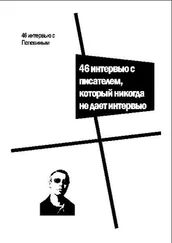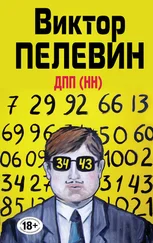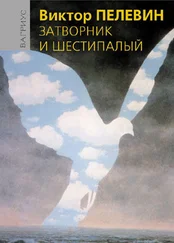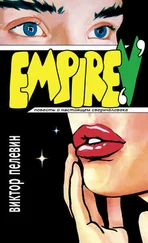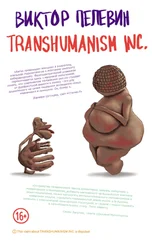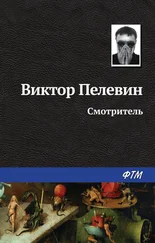Виктор Пелевин - Babylon
Здесь есть возможность читать онлайн «Виктор Пелевин - Babylon» весь текст электронной книги совершенно бесплатно (целиком полную версию без сокращений). В некоторых случаях можно слушать аудио, скачать через торрент в формате fb2 и присутствует краткое содержание. Жанр: Современная проза, на английском языке. Описание произведения, (предисловие) а так же отзывы посетителей доступны на портале библиотеки ЛибКат.
- Название:Babylon
- Автор:
- Жанр:
- Год:неизвестен
- ISBN:нет данных
- Рейтинг книги:5 / 5. Голосов: 1
-
Избранное:Добавить в избранное
- Отзывы:
-
Ваша оценка:
- 100
- 1
- 2
- 3
- 4
- 5
Babylon: краткое содержание, описание и аннотация
Предлагаем к чтению аннотацию, описание, краткое содержание или предисловие (зависит от того, что написал сам автор книги «Babylon»). Если вы не нашли необходимую информацию о книге — напишите в комментариях, мы постараемся отыскать её.
Babylon — читать онлайн бесплатно полную книгу (весь текст) целиком
Ниже представлен текст книги, разбитый по страницам. Система сохранения места последней прочитанной страницы, позволяет с удобством читать онлайн бесплатно книгу «Babylon», без необходимости каждый раз заново искать на чём Вы остановились. Поставьте закладку, и сможете в любой момент перейти на страницу, на которой закончили чтение.
Интервал:
Закладка:
‘And where’s the actual statue?’
‘I don’t actually know,’ said the secretary with a shrug. ‘Probably in some warehouse somewhere. But if you want to see what it looks like, the catalogue’s over there on that little table.’
‘What difference does it make where the statue is?’
Tatarsky swung round. Azadovksy had come up behind him unnoticed.
‘Maybe none at all,’ said Tatarsky. ‘To tell the truth, it’s the first time I’ve come across this kind of a collection.’
‘It’s the cutting edge in design,’ said the secretary. ‘Monetaristic minimalism. They say it was invented here in Russia.’
‘Take a walk,’ Azadovsky said to her, and turned to Tatarsky. ‘D’you like it?’
‘It’s interesting. But I don’t really understand it.’
"Then I’ll explain,’ said Azadovsky. "This bastard Spanish collection cost something like two hundred million dollars, and another hundred thousand went on the art historians - which picture would suit, which picture wouldn’t fit in, which order to hang them in, and so forth. Everything mentioned on the invoices has been bought. But if we brought all those paintings and statues here - and there are tapestries and suits of armour as well - there’d be no space left in here to move. You’d choke to death on the dust alone. And afterwards… Well let’s be honest, after you’ve seen these pictures once - maybe twice - what’re you going to see that’s new?’
‘Nothing.’
‘That’s right. So why keep them in your own place? Anyway, I reckon this Picasso’s a complete and utter plonker.’
‘I couldn’t entirely agree with you there,’ said Tatarsky, swallowing. ‘Or rather, I could, but only starting from the post-cubist period.’
‘I can see you’re a brainbox,’ said Azadovsky. ‘But I don’t get it. What’s the damn point, anyway? In a week’s time it’ll be the French collection. Just think: you figure one lot out, then a week later they cart it away and hang up another lot - so you’re supposed to figure that lot out as well? What’s the point?’
Tatarsky couldn’t think of a good answer.
‘I tell you, there isn’t one,’ Azadovsky insisted. ‘OK, let’s go. It’s time to get started. We’ll come back here afterwards. For some champagne.’
He turned and set off towards the mirror wall. Tatarsky followed him. When he reached the wall, Azadovsky pushed against it with his hand and the vertical row of mirror blocks casting an electrical reflection on him swung silently around their axis. Through the opening created a corridor built of rough-hewn stone came into view.
‘Go on in,’ said Azadovsky. ‘Only keep your head down:
the ceiling’s low in here.’
Tatarsky entered the corridor and the damp immediately made him feel even more cold. When will they let me get dressed? he thought. The corridor was long, but Tatarsky couldn’t see where it was leading: it was dark. Occasionally he felt a sharp stone under his foot and winced with the pain. At last there was a glimmer of light up ahead.
They emerged into a small room lined with wooden boards that reminded Tatarsky of a changing room for a gym. In actual fact, it was a changing room, as the lockers by the wall and the two jackets hanging on a coat-stand made clear. Tatarsky thought one of them belonged to Sasha Blo, but he couldn’t be absolutely certain - Sasha had too many different jackets. There was a second exit from the changing room, a dark wooden door with a golden plaque engraved with a jagged line, looking like the teeth of a saw. Tatarsky still remembered from school that that was how the Egyptian hieroglyph for ‘quickly’ looked. He’d only remembered it then because of a funny story connected with it: the ancient Egyptians, so their teacher had explained, used to build their zig-gurats very slowly, and so in the inscriptions of the greatest and most powerful Pharaohs the short jagged line meaning ‘quickly’ had become very long and even took up several lines, meaning ‘very, very quickly’.
Hanging beside the washbasin, looking like decrees from some unknown authority, there were three sheets of paper with typed texts and seals (Tatarsky guessed they were not decrees at all, but more likely part of the Spanish collection), and one of the walls was covered with shelves with numbered pigeon-holes containing bronze mirrors and golden masks exactly like the ones in Azadovsky’s reception room.
‘What’s that?’ Azadovsky asked. ‘Did you want to ask something?’
‘What are these sheets of paper on the walls?’ Tatarsky asked. ‘More of the Spanish collection?’
Instead of replying Azadovsky took out his mobile phone and pressed its one and only button.
‘Alla,’ he said, ‘some questions here for you.’ He handed the telephone to Tatarsky.
‘Yes?’ said Alla’s voice in the handset.
‘Ask her what we’ve got in the bath-house changing room,’ said Azadovsky, pulling off his vest. ‘I keep forgetting all the time.’
‘Hello.’ said Tatarsky, embarrassed, ‘this is Tatarsky again.
Tell me, this exhibition in the changing room, what is it?’
‘Those are absolutely unique exhibits,’ said the secretary. ‘Im not allowed to talk about them over the phone.’
Tatarsky covered the mouthpiece with his hand. ‘She says it’s not for discussion on the phone.’
‘Tell her I give my permission.’
‘He says he gives his permission,’ Tatarsky echoed.
‘Very well,’ sighed the secretary. ‘Number one: fragments of the gates of Ishtar from Babylon - lions and sirrufs. Official place of keeping, the Pergamon museum in Berlin. Certified by a group of independent experts. Number two: lions, bas-relief of moulded brick and enamel. Street of Processions, Babylon. Official place of keeping, the British Museum. Certified by a group of independent experts. Number three: Fukem-Al, a dignitary from Mari. Official place of keeping, the Louvre…’
‘Fukem-Al?’ Tatarsky repeated, and remembered he’d seen a photograph of this statue in the Louvre. It was thousands of years old, and it was a portrait of a cunning-looking little man carved in brilliant white stone - with a beard and dressed in strange, fluffy, skirtlike culottes.
‘I really like that one,’ said Azadovsky, lowering his trousers. ‘No doubt he woke up every morning and said: "Ah, fukem al…" And so he was all alone all his life, exactly like me.’
He opened a locker and took out two unusual-looking skirts made either of feathers or fluffed-up wool. He tossed one over to Tatarsky and pulled the other up over his red Calvin Klein underpants, which immediately made him look like an overfed ostrich.
‘Let’s have the phone,’ he said. ‘What are you waiting for? Get changed. Then pick up a set of this junk here and go on through. You can take any pair you like, just as long as the muzzle’s the right size.’
Azadovsky took a mask and a mirror from one of the pigeon-holes and clanged them against each other, then raised the mask and looked at Tatarsky through the eye-slits. The small golden face of an unearthly beauty, which might have appeared out of a crowd of maskers at a Venetian carnival, was so out of keeping with his barrel-shaped torso covered in ginger hair that Tatarsky suddenly felt afraid. Pleased with the effect he’d produced, Azadovsky laughed, opened the door and disappeared in a beam of golden light.
Tatarsky began getting changed. The skirt Azadovsky had given him was made out of strips of long-haired sheepskin stitched together and glued to nylon Adidas shorts. Squeezing himself into it somehow or other (if Tatarsky hadn’t seen the statue of Fukem-Al, he would never have believed the ancient inhabitants of Mesopotamia actually wore anything of the kind), he put on the mask, immediately pressing it firmly over his face, and picked up the mirror. There could be no doubt that the gold and bronze were genuine - it was obvious from the weight alone. Breathing out as though he was about to plunge into cold water, he pushed open the door marked with the jagged line.
Читать дальшеИнтервал:
Закладка:
Похожие книги на «Babylon»
Представляем Вашему вниманию похожие книги на «Babylon» списком для выбора. Мы отобрали схожую по названию и смыслу литературу в надежде предоставить читателям больше вариантов отыскать новые, интересные, ещё непрочитанные произведения.
Обсуждение, отзывы о книге «Babylon» и просто собственные мнения читателей. Оставьте ваши комментарии, напишите, что Вы думаете о произведении, его смысле или главных героях. Укажите что конкретно понравилось, а что нет, и почему Вы так считаете.

